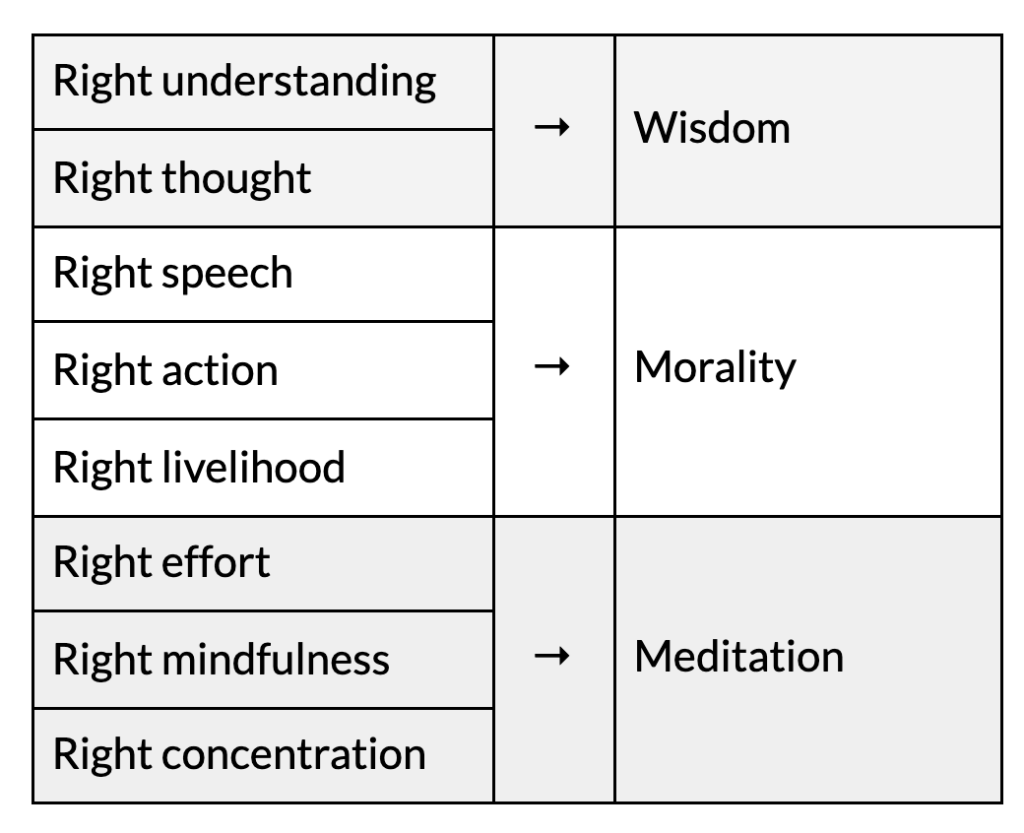Reading time: 5 minutes
With the knowledge that suffering is not permanent or inevitable, we can confidently seek a cure — a method to bring our suffering to an end. In the Fourth Noble Truth, the Buddha presents this method, called the Noble Eightfold Path.
Following his initial sermons on the Four Noble Truths, the Buddha spent the better part of the next 45 years of his life teaching this path. The Eightfold Path is the heart of Buddhism, serving as the Buddha’s prescription to cure the ailment that is our suffering.
The eight parts of the path are:
- Right understanding (or view): perceiving things as they really are, or in other words, understanding the Four Noble Truths
- Right thought (or intention): being guided by non-violence, concern for others, and selfless renunciation
- Right speech: avoiding any form of harmful speech, including gossip, insults, or harsh words
- Right action (or conduct): treating others with respect and having concern for their wellbeing
- Right livelihood: having a profession that does not inflict harm to others
- Right effort: exerting effort and arousing willpower to produce wholesome mental states
- Right mindfulness: cultivating conscious awareness of reality through the practice of meditation
- Right concentration: developing a capacity to hold a prolonged, “one-pointed” focus
It’s helpful to recognize that these are not sequential steps, but rather interconnected ways of living and being that should be practiced whenever possible. The practice of each informs and support the fulfillment of each of the other factors. Each of these factors contributes to the cultivation of three primary results that lead to liberation from suffering:
- Wisdom (or insight)
- Morality
- Meditation (or mental discipline)
The eight parts of the path and these three fruits thus fit together:

A simple way to understand the heart of the Buddha’s teaching is that compassion and wisdom are essential qualities to attain liberation from suffering. Meditation, or mental discipline, is a crucial practice for cultivating compassion and wisdom, which in turn is reinforced by our ongoing development of these qualities. The eight parts of this path embody these qualities.
Practice of the path is a virtuous cycle. As we attain insights and glimpses of freedom from the pervasive suffering in our lives, this reinforces our drive to continue the path.
Path to liberation on a global scale?
In previous posts, we looked at some examples of how human suffering contributes to global issues such as environmental degradation and exploitation of both people and nature. Can this path also lead to liberation from suffering on a larger scale — helping to alleviate the issues underlying the SDGs?
Let’s explore two possible ways this teaching can be of benefit: for personal development and growth as practitioners that seek to contribute to sustainable development; and for better understanding how our individual behavior — and accountability for our behavior — can play a part in finding solutions.
The path for personal development
As practitioners of sustainable development, we can see some clear benefits of this straightforward path. Following the Eightfold Path can help cultivate a strong motivation to do this work, resilience to stick through inevitable challenges, and a deeper understanding of the objective causes of social and environmental issues, as well as the root causes at the level of the human mind.
Practicing right speech, right action, and right livelihood contribute to our sense of morality & compassion. This means committing to a concern for others and cultivating respect for all the people and beings affected by human societal development. This helps to provide the big “Why” behind our work. The work is hard and frustrating, the obstacles are many, and burnout and cynicism can derail progress. Dedicating to the ideal of compassion can be a better motivator than other external goals, keeping us going even when times are hard.
The practice of meditation can provide a solid foundation for cultivating the positive qualities of wisdom and compassion. This kind of mental discipline also supports our efforts to succeed in our goals as sustainable development practitioners. Right effort, right mindfulness, and right concentration train us to focus on what is true, what is beneficial, and what will ultimately benefit others. The mind is like a wild horse, ready to run rampant at every moment. Meditation helps to tame and harness the power of this mighty beast for a useful purpose.
Finally, as we commit to this practice over time, right understanding and right intention can help to cultivate wisdom. Contemplation and regular meditation — combined with science-based policy and tools — can provide a deeper understanding of the root causes, supporting conditions, and potential solutions to wicked problems.
The path for sustainable development
What about at a larger scale than personal development — can the Eightfold Path shine a light on solving problems at the root of the SDGs? This post only provides a superficial analysis of the connections between the “mental afflictions” described by the Buddha and their consequences. But even a cursory glance can see clear relationships.
As discussed in the previous post, the root causes of greed, aversion, and delusion lie at the heart of some glaring wicked problems, including rampant consumerism, environmental degradation, human and animal exploitation, and economic inequities and injustice. When we know these causes, we also know they can be eliminated.
Right understanding and right intention can reduce some of the delusion that drives unsustainable behavior. We know that having more stuff is not going to make us happier. And we know that producing more stuff in a way that destroys the planet and exploits people is definitely not going to make us happier. Understanding this, we can find a motivation to reduce this overconsumption in our own lives and communities.
Right speech, right action, and right livelihood lie at the heart of many ethical or responsible corporate practices. Businesses worldwide commit to embedding better treatment of people and nature into their systems — the critical area of Corporate Social Responsibility. Supporting efforts to embed these practices even more deeply within our businesses can help to create an entirely new “business-as-usual.”
Promoting the practice of meditation, embodied by right effort, right mindfulness, and right concentration as a commonly accepted practice — something as ordinary and recommended as physical exercise — could support a widespread shift in societal attitudes towards the issues the SDGs seek to address. As more members of society commit to training their minds, we could see significant changes in behavior.
It would be naive to think this is easy to promote “spiritual” practices like this at a massive scale.
But this is also at the heart of Buddhist practice: a commitment to work for the welfare of others — no matter how long it takes.
In the next series of posts, we’ll take a deeper dive into the parts of the Eightfold Path. Subscribe below for updates!

